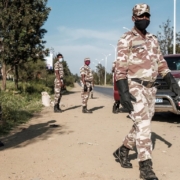Five Reasons why the UN Security Council needs to deal with the humanitarian crisis in Ethiopia
World Peace Foundation | Alex de Waal | 14.12.2020
Today, the UN Security Council members are expected to discuss the humanitarian crisis in Tigray.
It’s a matter for UN Security Council urgent business for several reasons.
First, it’s an internationalized crisis: there are over 45,000 refugees in Sudan and within weeks there could be three times that number. There are over 100,000 Eritrean refugees in Ethiopia, and the Eritrean army has overrun their camps and is reportedly forcing conscripting youth, while the Federal Government is proposing to send over 100 Eritreans who made it as far as Addis Ababa back to Tigray, likely into the hands of the Eritrean army.
Second, there’s little doubt that starvation crimes are being committed in Tigray. There is good reason to suppose that parties to the conflict—the Ethiopian federal forces and militia, the Tigrayan forces and the Eritrean army—are violating the prohibition on using starvation as a weapon. These violations demand an international investigation.
Third, Ethiopia will be asking international donors—including the United States, Europe and Japan, among others—to foot the bill. Just five years ago, Ethiopia was on the point of graduating from the status of famine-prone country, with its large-scale pathbreaking programs for food security. Not only is there a vast manmade food crisis enveloping Tigray, but it’s now deeply uncertain whether Ethiopia can muster the financial and institutional capacity to deal with a large-scale nationwide food security challenge such as that which threatened in 2015. Having invested heavily over the last 25 years in the achievements of Ethiopia’s pro-poor developmental state and famine prevention mechanisms, international aid donors have a legitimate interest in preventing relapse.
Fourth, the African Union has failed Ethiopia thus far. There has been no African Union Peace and Security Council meeting on the topic. South Africa discouraged the UN Security Council for discussing the conflict. The African Union envoys were rebuffed. Yesterday, Sudanese Prime Minister Abdalla Hamdok announced an emergency summit of the InterGovernmental Authority on Development (IGAD) on Ethiopia. His initiative needs the highest level of international backing.
Fifth, under UN Security Council resolution 2417 of May 2018, the United Nations Secretary General is required to report swiftly to the Council on any situation of armed conflict that threatens widespread food insecurity. The Ethiopian and Eritrean war in Tigray is precisely such a scenario for enacting this provision.


Leave a Reply
Want to join the discussion?Feel free to contribute!